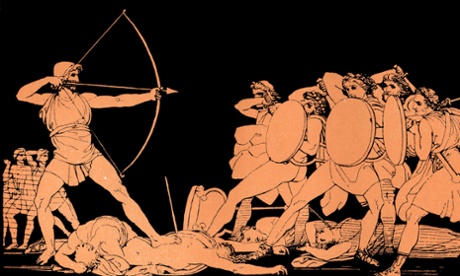
Decline and Fall
(A cautionary tale which may or may not be sung to the tune of Gilbert & Sullivan’s Major-General’s Song)
Homer wrote the Iliad and latterly the Odyssey
(One heroey-and-battley, one monstery-and-goddessy);
He’s European literature’s indubitable fountainhead
(Though, modestly, he’d claim it was those Muses on that Mount instead).
Then Homer was the model for the epic of Vergilius
(Or ‘Virgil’ as we call him now, to sound less supercilious);
For centuries the world revered his masterful hexameters
But nowadays they fall outside curricular parameters.
For modern pedagogues, equating relevance with recency,
Eschew our ancient texts without propriety or decency
Resulting in a cultural and moral disinheritance
Which means that we’re no better than the – OMG! – Americans.
The Major-General’s Song, from The Pirates of Penzance, has been parodied a lot, brilliantly and less-than-brilliantly. Nic Aubury’s jeu d’esprit, Decline and Fall, occupies the brighter band of the spectrum. My only complaint is that I’d have liked more verses. But that’s just greed, as the poem achieves in its 12 lines exactly what it has set out to achieve.
Here’s a reminder of the opening of the original patter-satire in which Major-General Stanley introduces himself:
“I am the very model of a modern Major-General,
I’ve information vegetable, animal, and mineral,
I know the kings of England, and I quote the fights historical,
From Marathon to Waterloo, in order categorical;
I’m very well acquainted too with matters mathematical,
I understand equations, both the simple and quadratical,
About binomial theorem I’m teeming with a lot o’ news–
With many cheerful facts about the square of the hypotenuse.”
Poetic parody is – ahem – a funny genre. Its purpose varies. Sometimes, it sets out to mock the style, technique or message of the original poem: sometimes, it has entirely other fish to fry, and simply borrows the frying pan. Decline and Fall has its own satirical target: the demotion of classics from the literary curriculum, the overemphasis on “recency”. It’s a contemporary theme, yet not unrelated to the object of WS Gilbert’s satire.
The Major-General’s Song targets the late Victorians’ ambitious educational programme for military recruits. The learned Major-General Stanley has acquired extensive knowledge of “matters vegetable, animal and mineral” but, ironically, an inadequate grounding in military history: that body of knowledge, as he innocently asserts, “has only been brought down to the beginning of the century.” Aubury’s speaker also points an accusatory finger at educational fashions and the short memories of curriculum-planners. This is a small but significant yoking of parody-poem to its original, particularly apt for an argument in favour of literary inheritance.
So what about the metre bequeathed to Aubury? AE Stallings goes into substantial detail as she brings it under the umbrella of dipodic verse. I like the suggestion that it be called iambical octameter, but the metre needn’t be “iambical”, of course. The first line of Decline and Fall is actually trochaic – a strong, confident foot to step out on. Either way, the line has eight small stresses, perhaps more comfortably registered as four big ones.
The obvious challenge of the verse-form is to find amusing and unforced triple-rhymes (/ - -) for the couplets. But that’s relatively easy: although the Major-General must play at being “bothered for a rhyme” at the end of each verse, it’s likely that his clever creator had many of the rhymes at his fingertips. There’s a finer skill required in the weaving of an effortless-seeming line, and this requires judicious syllabic variation. Too many monosyllables and you get a military tattoo. Too many polysyllables and it’s a mouthful. Aubury rings the changes very appealingly. A fair scattering of three-syllable words prepares the ear for the rhyme-triplex. But the syllable-count rises dramatically in those coined compounds of the second line, “heroey-and-battley” and “monstery-and-goddessy.” Seven syllables for each adjective! Aubury has learned from his “plucky and adventury” model in adding a ‘y’ to render a noun adjectival. The device is playful, and this serves the poem’s argument: it makes us feel that epic magnificence may not be scarily unapproachable, after all. Likewise, it humanises the speaker.
An oration upholding traditional educational values suggests a crusty old school persona (even if you agree with much of it) and the concluding low jab of Brit snobbery against those barbarian “Americans” would therefore be in character, even as a joke. The “disinheritance/ Americans” rhyme is “off” as well as off-colour, and, preceded by an “OMG” exclamation, produces an effect knowingly bathetic, self-debunking. Aubury’s speaker, for all his fine intentions, for all his sense of superiority, helplessly belongs to the fallen world he admonishes. The implication must be that the restoration of old, high-cultural values is a receding hope. The great “fountainhead” literary texts are already being supplanted by “text”. The poem’s title, after all, is Decline and Fall.
One of the 21 emergent poets featured in Carcanet’s latest “New Poetries” anthology, New Poetries VI, Aubury has previously published a pamphlet, Small Talk, and a full-length collection, Cold Soup, both with Nasty Little Press. His contribution to New Poetries VI announces an exceptionally graceful gift for the kind of formal verse usually termed, often very unfairly, “light,” and marks the latest entry to an enormously distinguished circle. Its membership is larger than it first looks, but let’s begin with a few names: Wendy Cope (who also found parodic inspiration in Gilbert & Sullivan), Sophie Hannah, James Fenton, John Fuller, Kit Wright … And surely some of our Poem of the Week parodists are waiting in the wings. Over to you.

